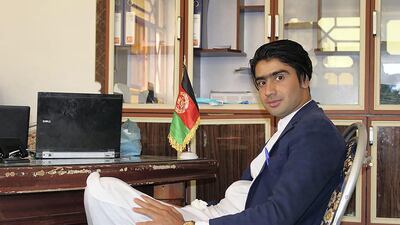“Dear Mr President, the land of Farah has no more capacity to build cemeteries for our youth,” Afghan journalist Javid Noori, 27, wrote on his Facebook page in November, frustrated at the rising number of civilian casualties in his home province in western Afghanistan.
“We would thank you to provide us land for graveyards to bury 20 people at a time,” he wrote, along with updates on civilian casualties of Afghanistan's long-running insurgency by the Taliban.
A few weeks later, the radio show host became a victim himself.
Noori was travelling with relatives on Saturday when their vehicle was stopped at a checkpoint set up by Taliban insurgents in Nadarabad district. Upon being identified as a journalist, Noori was taken aside by the militants and executed, becoming the first Afghan media worker to be killed in 2019 after a particularly deadly year for the profession.
"The Taliban had a checkpoint on the main road and had stopped our cars. They took about 50 to 60 male passengers and took us far away from the main road. I was walking right behind Mr Noori and his relatives," a witness told The National.
“I noticed that they recognised Noori and his [relatives] and were asking them questions,” he said. The Taliban eventually let some of the passengers go, but took Noori and his family aside.
“Noori tried to join the group of passengers who were being released but he was captured again, and I did not see him after that.”
The witness suspects that Noori was perhaps set up to be killed. “We were all very scared and we thought we might get killed, but the Taliban only killed him. It seemed to us that they were expecting him,” he said.
At least 15 journalists were assassinated or killed in the line of duty during 2018, making Afghanistan the most dangerous country for journalists last year, according to the Committee to Protect Journalists. In April, a suicide bomber posing as a journalist detonated a bomb hidden in a camera among a crowd of news photographers and camera crew, killing nine. Journalists were targeted across the country in other attacks, especially during campaigning and voting for the parliamentary elections held in October.
Reporters Without Borders (RSF) said Noori's "summary execution is the first death of a journalist in 2019 to be registered on RSF’s barometer”.
_______________
Read more:
Taliban blames US and Afghan forces for most civilian casualties in 2018
Taliban cancel Afghanistan peace talks with the United States
Disappointment in Afghanistan following Trump's flawed lesson
_______________
“There is an urgent need to end such practices. We reiterate our appeal to the international community to condition the start of any talks with the Taliban on their giving an explicit undertaking to respect international humanitarian law’s basic treaties, starting with the Geneva Conventions,” Reza Moini, head of RSF's Afghanistan-Iran desk, said in a statement issued on Tuesday.
Noori was an "extremely calm person and very passionate about his work", his supervisor at Radio Nishat, Hamidullah Hamidi, told The National.
"He joined the radio station two years ago and often worked without pay,” Hamidi said.
Noori often focused social issues in his shows and was outspoken critic of the insurgency as well as the government, he said. Many of his posts focused on the victims of terrorism, wanting to give a face and voice to the statistics. “He had also started to host a show on mental health, after he graduated in psychology from Kabul University.”
The Taliban admitted executing Noori, referring him as a “hireling officer” — a term used for government employees. Noori also worked in the Farah regional government's human resources department.
Hamidi said the government had been asked to investigate his killing "because we are not certain if the armed men who killed him were indeed Taliban or another insurgency or criminals”.
While the Taliban says it attacks only security forces and government targets, thousands of civilians are killed each year. The militants have continued their attacks while holding several rounds of peace talks with the US and regional players over the past few months.
On Thursday, the Taliban launched a series of attacks on security checkpoints in four Afghan provinces, killing 32 members of the security forces and pro-government militias, provincial officials said.
Taliban spokesman Zabihullah Mujahid said the militants captured a large amount of weapons and ammunition during the attacks in the northern provinces of Kunduz, Baghlan and Takhar, and in Badghis in the west.

